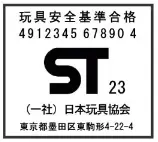
What is Japan’s ST Toy Certification?
In the context of global cross-border e-commerce, more and more merchants are turning their attention to the Japanese market. Japan is known for its strict product quality and safety standards, especially when it comes to children's toys. The ST Certification (Safety Toy certification) is a key requirement for toy products in Japan. Only toys that pass this certification can be legally sold in the Japanese market. So, what exactly is the ST Certification? How can you successfULly obtain it? Today, we’ll explain it in detail!

What is ST Certification?
ST Certification, short for "Safety Toy Certification System," is a mandatory safety certification system in Japan for toy products. It verifies that toys comply with Japanese safety standards and ensures children’s safety during play. Toys without ST Certification cannot be legally sold in Japan. Therefore, any toy intended for sale in Japan must obtain this certification.
Scope of ST Certification
ST Certification applies to all toys intended for children under 12 years old. Specifically, it includes:
1. Plastic toys, fabric toys, plush toys, etc.
2. Educational toys, puzzle toys
3. Mechanical toys (such as musical toys, remote control toys, etc.)
4. Any items that may be used by children under 12 for entertainment or educational purposes
Whether traditional or smart interactive toys, all fall under the regulation of ST Certification.
Main Standards of ST Certification
ST Certification standards are mainly based on Japan’s Toy Safety Standards. These include various aspects such as:
1. Physical and Mechanical Safety: Ensuring toys have no sharp edges or detachable small parts that could cause injury.
2. CheMICal Safety: Ensuring toys are free from harmful substances like heavy metals and excessive phthalates.
3. Fire Safety: Certain toys, especially electronic ones, must have fire resistance properties.
4. Hygiene Safety: Toy materials must be non-toxic and comply with Japan’s hygiene standards.
5. Labeling Requirements: All certified toys must display the ST mark along with warnings in Chinese or Japanese.
These strict standards ensure children's safety during play.
ST Certification Application Process
The process of obtaining ST Certification is standardized. Merchants can follow these steps:
1. Product Preparation: Prepare toy samples for certification and ensure they meet safety standards.
2. Choose a Certification Body: Japan has several authorized organizations that provide ST Certification. Merchants should select an officially recognized body.
3. Submit an Application: Submit the toy samples, product manuals, production processes, and pay the certification fee.
4. Testing and Evaluation: The certification body conducts comprehensive safety tests on the samples, including physical, chemical, and fire safety evaluations.
5. Receive Certification: If the tests are passed, the organization will issue the ST Certificate and the toy can be sold in Japan.
6. Labeling and Compliance: After certification, merchants must label the product and packaging with the ST mark to comply with Japanese regulations.
Important Notes about ST Certification
1. Long Certification Period: Testing and review usually take several weeks, so plan ahead.
2. Details Matter: Small design or material flaws may result in certification failure. Pay close attention during design and production.
3. Regular Reviews: Certification is not permanent. If toy design or production changes, re-application may be requiRED.
Why Obtain ST Certification?
1. Compliance: ST Certification is mandatory in Japan. Toys without it cannot be sold.
2. Consumer Trust: Toys with ST Certification increase consumer confidence, especially in safety-conscious Japan.
3. Market Access: Certified toys can smoothly enter Japanese retail channels, gain official approval, and enhance competitiveness.
Specific Requirements of ST Certification
Part 1 – Mechanical and Physical Properties
1. Determine whether the toy contains sharp edges or dangerous points.
2. Conduct abuse tests (compression, tension, torsion, impact, drop tests, etc.).
3. Check for small balls or parts that could be swallowed, posing a choking hazard.
4. For large stationary toys, assess stability to prevent collaPSE and injury.
5. Outline testing methods and specify packaging and labeling requirements.
Part 2 – Flammability
1. Head-worn toys, including hairpieces and antennae.
2. Toys that children can enter (e.g., play tents), plush toys, etc., are judged based on their burning rate.
3. The maximum allowed burning speed is 30 mm/s.
Part 3 – Chemical Properties
1. Limits for heavy metals in surface paints, coatings, inks, etc.: Lead (Pb), Mercury (Hg), Cadmium (Cd), Chromium (Cr), Selenium (Se), Antimony (Sb), Arsenic (As), Barium (Ba).
2. Migration of dyed substances.
3. Requirements for materials containing polyethylene and polyvinyl chloride.
4. Testing for formaldehyde and phthalates in textile materials used in toys.
Email:hello@jjrlab.com
Write your message here and send it to us
 European Toy Safety Standard EN 71-20:2025
European Toy Safety Standard EN 71-20:2025
 EN 18031 Certification for Connected Devices on Am
EN 18031 Certification for Connected Devices on Am
 Compliance Guide for Portable Batteries on Amazon
Compliance Guide for Portable Batteries on Amazon
 2026 EU SVHC Candidate List (253 Substances)
2026 EU SVHC Candidate List (253 Substances)
 LFGB Certification Cost and Timeline Guide
LFGB Certification Cost and Timeline Guide
 Bluetooth FCC Test Report
Bluetooth FCC Test Report
 Is FCC Testing Required?
Is FCC Testing Required?
 Where to Find FCC Test Reports
Where to Find FCC Test Reports
Leave us a message
24-hour online customer service at any time to respond, so that you worry!




